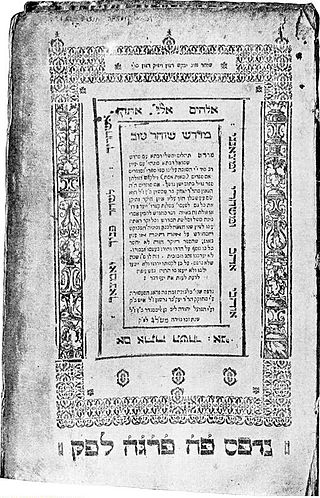Halakha, also transliterated as halacha, halakhah, and halocho, is the collective body of Jewish religious laws that are derived from the Written and Oral Torah. Halakha is based on biblical commandments (mitzvot), subsequent Talmudic and rabbinic laws, and the customs and traditions which were compiled in the many books such as the Shulchan Aruch. Halakha is often translated as "Jewish law", although a more literal translation of it might be "the way to behave" or "the way of walking". The word is derived from the root which means "to behave". Halakha not only guides religious practices and beliefs, it also guides numerous aspects of day-to-day life.

Judaism is an Abrahamic, monotheistic, and ethnic religion, comprises the collective spiritual, cultural, and legal traditions of the Jewish people. Contemporary Judaism having originated as an organized religion in the Middle East during the Bronze Age, and evolved from Yahwism around the 6th/5th century BCE, and is thus considered to be one of the oldest monotheistic religions. Along with Samaritanism, to which it is closely related, Judaism is one of the two oldest Abrahamic religions.

Jacob Neusner was an American academic scholar of Judaism. He was named as one of the most published authors in history, having written or edited more than 900 books.

Midrash is expansive Jewish Biblical exegesis using a rabbinic mode of interpretation prominent in the Talmud. The word itself means "textual interpretation", "study", or "exegesis", derived from the root verb darash (דָּרַשׁ), which means "resort to, seek, seek with care, enquire, require".

The Talmud is the central text of Rabbinic Judaism and the primary source of Jewish religious law (halakha) and Jewish theology. Until the advent of modernity, in nearly all Jewish communities, the Talmud was the centerpiece of Jewish cultural life and was foundational to "all Jewish thought and aspirations", serving also as "the guide for the daily life" of Jews.

The Gemara is an essential component of the Talmud, comprising a collection of rabbinical analyses and commentaries on the Mishnah and presented in 63 books. The term is derived from the Aramaic word גמרא and rooted in the Semitic word ג-מ-ר (gamar), which means "to finish" or "complete". Initially, the Gemara was transmitted orally and not permitted to be written down. However, after Judah the Prince compiled the Mishnah around 200 CE, rabbis from Babylonia and the Land of Israel extensively studied the work. Their discussions were eventually documented in a series of books, which would come to be known as the Gemara. The Gemara, when combined with the Mishnah, forms the full Talmud.

Jewish ethics is the ethics of the Jewish religion or the Jewish people. A type of normative ethics, Jewish ethics may involve issues in Jewish law as well as non-legal issues, and may involve the convergence of Judaism and the Western philosophical tradition of ethics.

Yeshiva Rabbi Chaim Berlin or Yeshivas Rabbeinu Chaim Berlin is an American Haredi Lithuanian-type boys' and men's yeshiva in Brooklyn, New York.
This is a list of books by Jacob Neusner. Articles, reviews, etc. are not included here.
Jewish commentaries on the Bible are biblical commentaries of the Hebrew Bible from a Jewish perspective. Translations into Aramaic and English, and some universally accepted Jewish commentaries with notes on their method of approach and also some modern translations into English with notes are listed.
José Faur was a Sephardic Hakham (rabbi), teacher and scholar. He was a Rabbi in the Syrian-Jewish community in Brooklyn for many years. He was also a professor at the Jewish Theological Seminary of America, the Spertus Institute for Jewish Learning and Leadership, and Bar Ilan University, and was Professor of Law at Netanya Academic College.

Avraham Eliezer Alperstein was an Orthodox Rabbi, Rosh yeshiva, publisher, communal leader and exceptional Talmudic scholar. He published the first ever section of Talmud in the United States.
In Judaism, views on abortion draw primarily upon the legal and ethical teachings of the Hebrew Bible, the Talmud, the case-by-case decisions of responsa, and other rabbinic literature. While all major Jewish religious movements allow or encourage abortion in order to save the life of a pregnant woman, authorities differ on when and whether it is permitted in other cases.
Peter W. Ochs is the Edgar M. Bronfman Professor of Modern Judaic Studies at the University of Virginia, where he has served since 1997. He is an influential thinker whose interests include Jewish philosophy and theology, modern and postmodern philosophical theology, pragmatism, and semiotics. Ochs coined the term "scriptural reasoning" and is the co-founder of the Society for Scriptural Reasoning, which promotes interfaith dialog among Christians, Jews, and Muslims through scriptural study groups. He is also a co-founder of the Children of Abraham Institute, which promotes interfaith study and dialog among members of the Abrahamic religions.
Tza'ar ba'alei chayim, literally "suffering of living creatures", is a Jewish commandment which bans causing animals unnecessary suffering. This concept is not clearly enunciated in the written Torah, but was accepted by the Talmud as being a biblical mandate. It is linked in the Talmud from the biblical law requiring people to assist in unloading burdens from animals.
Jewish Veg is an international 501(c)(3) charitable organization whose mission is to encourage and help Jews to embrace plant-based diets as an expression of the Jewish values of compassion for animals, concern for health, and care for the environment. Jewish Veg was formerly called Jewish Vegetarians of North America (JVNA) and, prior to that, the Jewish Vegetarian Society of America.

Eliyahu Rahamim Zini is the rosh yeshiva of Yeshivat Or Vishua, which he founded in Haifa in 2001. In the past, he has served as the rabbi of the Technion, as a lecturer in its Faculty of Mathematics, and in the Department of Humanities and Arts.
Geoffrey Claussen is an American rabbi and scholar who serves as a professor of Religious Studies at Elon University. His scholarship focuses on Jewish ethics, theology, and the Musar movement.
Yalta is among the few named female characters mentioned in the Babylonian Talmud who was a member of a rabbinic family. Yalta was the wife of Rav Nachman, a rabbinic sage from around 250 CE. The scholar Judith Hauptman suggests that Yalta was also the daughter of the Jewish exilarch in Babylon and considers her depiction in rabbinic literature as a strong-willed, free-spirited woman. Yalta is the second most-mentioned woman in the Talmud, after the daughter of Rav Chisda, and appears to have been knowledgeable in matters of Jewish ritual law.







